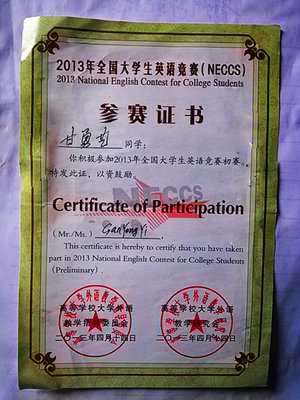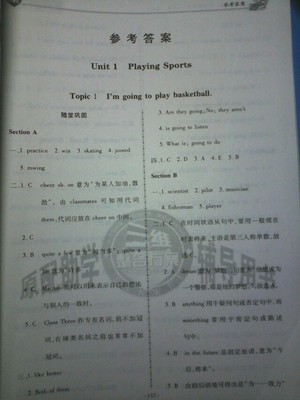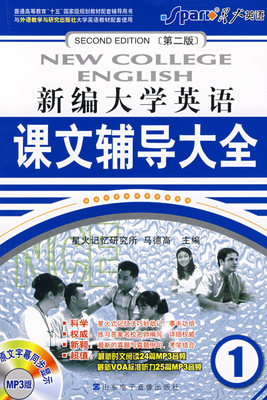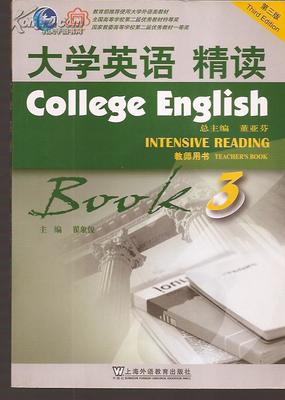新编大学英语(第一册)学习辅导
在新生陆续开学之际,“锦绣三合”及时推出新编大学英语(第二版第一册)的辅导材料,希望对三合的大一新生有所裨益,《新编大学英语》由浙江大学编著,应惠兰主编,外语教学与研究出版社出版,鉴于篇幅所限,文中仅显示第一单元的内容,其余单元的辅导材料请在文后点击链接下载。
Unit OneLove
Teaching Aims:
In this unit students are required to :
1) get to know some useful information concerningthe topic of the reading passages in this unit and to know moreabout English culture;
2) do some preparation activities such asdiscussion, group work, etc. to practice their spoken skill andcommunicative skills;
3) grasp some new words and try to use these wordswhich help them to enrich their vocabulary;
4)read the in-class reading passage in a limitedtime and grasp some expression_r_r_r_r_rs and grammatical points inthe in-class reading passage to improve their readingcomprehension;
5) do some post-reading exercises and someafter-class reading to practice what they have got to know in classto improve their English comprehensive skills.;
6) translate some typical sentences into Chinese or English byusing some expression_r_r_r_r_r_rs learned
in the reading passages to acquire some translating skills andbetter their translating abilities.
I. Useful Information
Whether it is a mother’s nurturing love for herchild, a son’s loyal love for his father, the love between husbandand wife, or the love between friends, love is a universal emotionthat expresses itself in every culture. To love is to be human. Toneed love is also to be human. Children, for example, need lovingcare in order to be emotionally healthy.
Love is a deep feeling of fondness, affection andfriendship that grows between people. Romantic love usually beginsas passion and evolves with time to a more lasting sense ofattachment. Many of the famous romantic love stories in variouscultures end in tragedies of death or betrayal. The loss of love isa favorite musical theme and the subject of countless stories,operas, songs, and ballads.
The verb “like” is not as strong as the verb “love”and generally does not imply deep emotions. “Like” means to findpleasure or satisfaction in something or someone: I like eating atthe restaurant; my son likes his teacher. In English, the word“love” is often used informally instead of “like” in an intensifiedsense: He loves music; Children love ice-cream; she loves her newjob. However, “love” and “like” are totally interchangeable. It isoften the context that indicates the strength of the word “love”.The verb “love” should not be used in the first person, whenspeaking to another person, except in romantic situations (I loveyou). When in doubt as to which verb to use, it is better to use“like” with an adverb: I like your dress a lot; I really like myprofessor; His boss liked his proposal immensely.
II. Preparation
1. Getting to know each other
Sample
My name is Wang Ling. I am 18. I come fromHangzhou, Zhejiang Province. I ?graduated from the Fourth MiddleSchool. Hangzhou is a very beautiful city. It has the West Lake,which is famous all over the world. I love my home town.
I have a lot of hobbies, such as playing tennis,basketball, table tennis, and listening to music.
2. Talking about someone you love
Sample
I love my mother most, because she is always verykind to me, unlike my father who will scold me or slap me if I makemistakes or if I am naughty. My mother is an ordinary-lookingwoman, but in my eyes she is very beautiful. She is veryhard-working and does almost all the housework. When I was workingfor the entrance examinations, she was very considerate and neverlet me do any housework. When I was hungry at night, she would fixa snack for me. She is a good cook. It’s a pity that I am not ableto have what she cooks because I am far away from home.
III. Listening-Centered Activities
Play the tape and make the students listen to thethree listening exercises and answer all the questions on page4、5、and 6. If necessary, play the tape once again.
IV. In-Class Reading
A Good Heart to Lean On
1. Pre-reading on p.9
Directions: Discuss the following questions inpairs.
1). How do you feel when you walk on the street andsee a disabled person?
I feel pity towards those who are disabled. Iwonder how they can manage in their daily life and whether theyhave a job. I feel lucky that I am not disabled.
2). Do you know anyone who is disabled? If you do,talk about him/her.
Yes. My aunt is deaf and dumb. She has been likethis since her childhood. My grandmother said that she became deafbecause of taking the wrong medicine. She is now more than seventyyears old and she has never been married. She was very kind to me.In fact it was she who brought me up. She often felt it unfairbecause she couldn’t hear. But she is very intelligent, and she isgood at sewing. She sometimes kidded /teased me with gestures thatshe wanted to cut off her ears because they couldn’t work.
2. Language Points:
1).…I was embarrassed to be seen with myfather.
e.g. I was embarrassed/felt uncomfortable when theothers saw me together with my father”
→to beashamed of : to feel shameful
e.g: I am ashamed of what I have done.
He was ashamed of having failed.
→to beashamed to do sth
e.g. I am ashamed to leave you this way.
I am ashamed to have mentioned it; please forgiveme.
2). to let on: to let sb know
e.g. Don’t let on about the meeting.
He doesn’t let on that he is richer than he reallyis.
We didn’t let on about how rich we were.
3). to set the pace:定速度,树立榜样
e.g. Our store set the pace in book sales.
John set a fast pace in walking.
→to keeppace with somebody:
e.g. I can’t keep pace with your plan.
Keep pace with times.
4). to adjust to: to change slightly in order to bemore suitable调整,校准, 使适应
e.g. to adjust to a new climate
She must to adjust herself to English life.
The desks and seats can be adjusted to the heightof any child.
5). to make it (to): to arrive somewhere in timefor sth; succeed in
e.g. We are too late; I don’t think we’ll makeit.
You can make it if you hurry.
After years as an unsuccessful businessman, he hasfinally made it.
6). to pull through: to recover fromillness恢复健康,度过难关
e.g. They hoped that he would pull through.
The doctor pulled her through.
The economic situation was serious, but they pulledthrough.
7). to marvel at: be greatly surprised at
e.g. to marvel at her beauty/his skill/histremendous achievements
8). to subject …to: to make sb experience sth,especially sth unpleasant
e.g. He was subjected to severe criticism.
He tries to subject the whole family to hiswill.
→to besubject to: to obey ; to abide by(adj.)受…约束力
e.g. We are all subject to the laws of thecountry.
→to besubject to: to tend to have; to be likely/apt to have容易受到
e.g. He is subject to headache.
All men are subject to death.
Japan is subject to earthquake.
9). now (that): because of the fact that
e.g. Now(that) you are here, let’s begin.
Now that you have come, you may as well stay.
Now that you are well again, you can travel.
10).to engage in: to take part in; to becomeinvolved in an activity从事,参与
e.g. If you engage in the local politics, you can’thave much time for your family.
I have no time to engage in gossip, so please don’tcome to me with your rumors and complaints.
→tobe engaged in: to be busy with sth; to be busy in doingsth从事,忙于
e.g. It is a hard and long struggle we are engagedin.
He was engaged in writing letters.
11). to participate in: to take part in; to joinin
to participate in the strike activities/thegame/the discussion/the war
e.g. I longed to have the opportunity ofparticipating in the strike activities.
Everyone can participate in this game.
12). to break out: (of fire, disease, violence,war, fight…) start suddenly (only used in active voice)
e.g. A fire broke out during the midnight.
The economic crisis broke out in the UnitedStates.
13). in frustration(和表示情绪的名词连用)
(the same kind of phrases: in relief , insurprise in astonishment ,in horror , in fun , in anxiety, infear, in amazement , indespair, in anger)
14). on leave: absence with permission
e.g. He went home on leave.
We are on leave until December.
To take one’s leave(formal):to say good-bye
e.g. He took his leave after thanking his host.
15). to see to (it that):确保;注意做到,务必要(注意:从句中不用进行时态和将来时)
e.g. See to it that you don’t fall.
See to it that you are here punctually tomorrowmorning.
16). to be gone: to be dead
e.g. Now that his wife is gone, he is all on hisown.
All is over. He is gone.
3. Questions for discussion:
Directions: Work in groups to discuss thefollowing questions.
1). What do you think makes a good heart?
I think there are many things to make a good heart.They are: kindness to others, endurance, hard-work, never hurtingothers, being satisfied with life, patience, etc..
2). What did you learn from this article about therelationship between the father and the son?
The father knew his disability stood in the waybetween him and his son. That’s why he said to his son:” You setthe pace. I’ll adjust to you.” The son was young, so he was ashamedof his father because other people stared at them. But deep intheir hearts they loved each other. The father was proud of hisson, and the son learned a lot from his father.
3). How and why does the son’s attitude change?
The son realized that it was his father who taughthim many things such as how to have a good heart. He knew thathaving a good heart was more important than having a goodappearance. Especially after his father died, he felt it moreintensely that it was his father who guided him in his life.
4). If you were the son, how would you feel towardsthe father?
If I were the son, I wouldn’t be embarrassed to beseen with him by others. I would be proud of my father no matterhow he looked because it was he who gave me life and brought me up.His disability was not his own choice. He was disabled, which washard enough for him. How could the others look down upon him, letalone his son.(let alone更不用说eg: The baby can’t walk, let alone run.He can’t speak his own native language well, let alone French.)
V. Further Development
1. Different kinds of love
Possible alternatives:
1) Loving members of one’s family: parents,grandparents, brothers, sisters, husband, wife, children,grandchildren
2) Loving one’s life, animals, nature, etc.
2. Group discussion
Sample I
I agree with the students, because I have pets. Ifeel happy when I’m with pets. I myself have a pet cat. I like himvery much, and I enjoy taking care of him. When I am unhappy or inlow spirits, I stroke him, cuddle (hold sth lovingly and closely inthe arms) him and then I feel much better. He is like one of myfriends. In a sense he is better than a friend because he neverargues with me and usually obeys me.
Sample II
I don’t agree with this statement. I am afraid ofanimals, especially dogs. I don’t know why, but I have been afraidof dogs since my childhood. At the sight of dogs, I shiver, I don’tunderstand how I can lower my blood pressure by stroking or pattingthem. On the contrary, my blood pressure would rise because I am sonervous around a dog and sometimes I can’t help screaming.
3. Translation on p.14
Translate the Chinese sentences into English, usingthe expression_r_r_r_r_r_r_rs in brackets.
1) He walksslowly because of his bad leg.
2) He cameto the meeting despite his serious illness.
3)Hesaw to it that the same mistake wouldn’t happen again.
4)Nowthat they have got to know each other a little better, they getalong just fine.
5)ThenI found myself surrounded by half a dozen boys.
6)Isend you my best wishes on this happy occasion.
4. Writing
To give the student a clearer idea of how toorganize their composition, the teacher may encourage the studentsto include the following in their writing:
·adescription of the physical features(height, weight, etc.) of thefather;
·characteristics of thefather
·what thestudent thinks of the father;
·somethingthat had happened between the father and the student
Sample I
My Father
My father , forty-six years old, is a peasant. Heis very hard-working, because he has a big family to support.Perhaps it is because he is tired, he is a man of few words, andalmost no smile appears on his face. Father has never bought anytoys or candies for my younger brother and me, but I know he lovesus. He is strict with us. He once said, “You should study hard sothat you can serve the people better in the future.” My family waspoor but father promised that he would pay for education of mybrother and me even if he had to sell our house. We were deeplymoved. We are determined to study hard to repay our father. I loveand admire my father.
Sample II
My Mother
My mother, a middle-aged woman, has a kind oftypical characteristic of oriental women. I will always be thankfulfor her love and I’ll love her forever. When I was a child, mymother took me to the kindergarten even when the weather was bad.When I was naughty and made mistakes, my mother never blamed me.Instead she often told me some enjoyable stories and from these Iwas able to know what I should do and what I shouldn’t do. When Iwent to school, my mother cared about not only my daily needs butalso my studies. When I did poorly in school, she often encouragedme to try my best again. She said she had confidence in me and toldme never to lose heart. I’ll remember her kindness and adviceforever.
5. Proverbs concerning love
●True love never grows old.
●True love is giving, not taking.
●All true love is founded on esteem.
●Love asks faith, and faith firmness.
●Without respect, love cannot go far.
●Love is the reward of love.
●Love lives in cottages as well as in courts.(爱情不分贫贱与富贵。)
下载链接:新编大学英语第1册辅导.RAR
(解压密码6304326,未经允许不得转载)
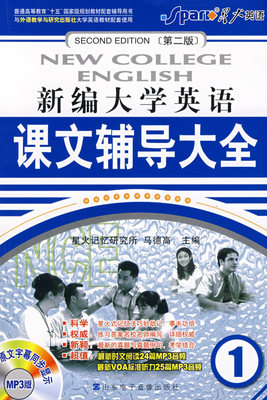
 爱华网
爱华网